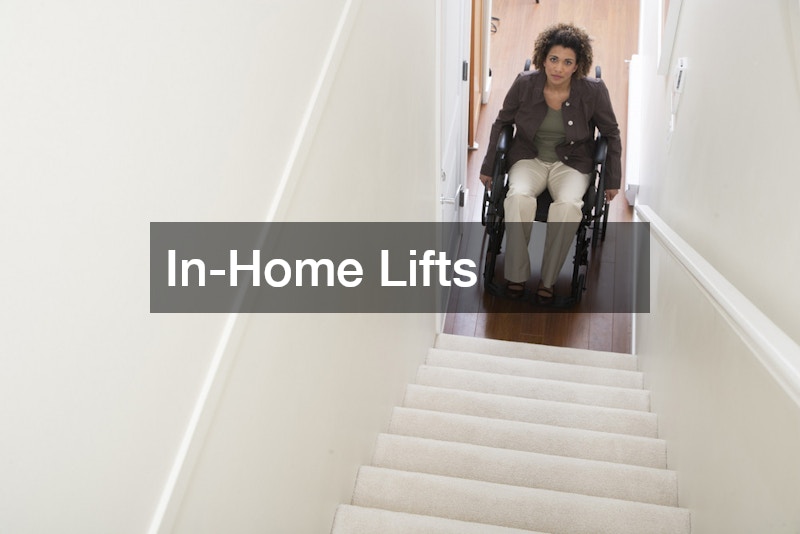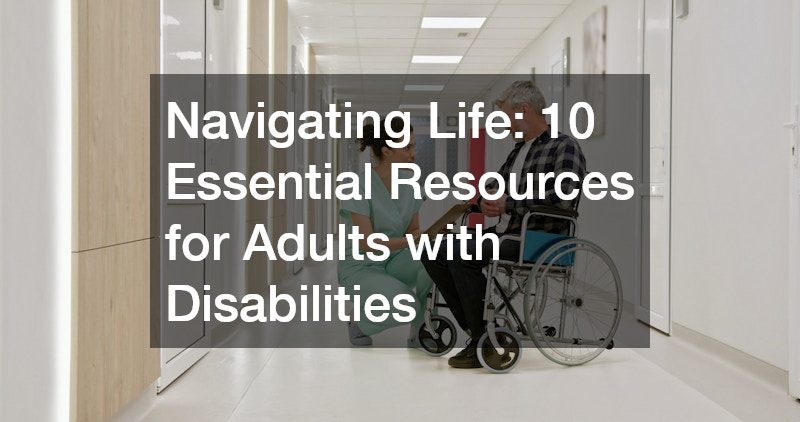Adulthood comes with a wide range of responsibilities, challenges, and decisions, and for those living with disabilities, these experiences are often amplified by additional considerations. Whether it’s accessing medical care, adapting a home for better mobility, or finding transportation and trustworthy service providers, navigating everyday life can require a more comprehensive network of resources for adults with disabilities. Understanding where to turn and what to ask for can make a tremendous difference in quality of life. Fortunately, a variety of helpful services and solutions are available to empower adults with disabilities in their pursuit of independence, stability, and overall well-being.
The landscape of support available today is broader than ever before, encompassing everything from legal advocacy and personalized healthcare to mobility enhancements and in-home assistance. However, knowing what’s available—and how to access it—can often feel overwhelming. Many individuals and families find themselves in unfamiliar territory, uncertain about how to piece together a sustainable and supportive lifestyle. The good news is that a wide array of resources exists specifically to meet these needs, designed to support people in living more confidently and independently.
This guide highlights ten essential areas that form the foundation of support for adults with disabilities. Each section of this blog explores a vital resource that plays a key role in creating a safer, more accessible, and more empowered daily life. From trusted healthcare professionals and adaptive equipment to helpful community programs and trained service animals, these topics are intended to inform and inspire thoughtful planning and action.
What follows is a detailed look at each of these ten support categories, including what they offer, how they can be accessed, and why they matter. Each section is grounded in practicality, offering insights into both general benefits and specific applications, so readers can understand how these services intersect with their lives or the lives of loved ones. Whether you are newly navigating life with a disability or have long been advocating for yourself or others, this article is designed to be a helpful, thorough, and empowering guide to the most critical resources available. By the end of this piece, you’ll not only have a clearer understanding of what’s out there—you’ll be better equipped to build the network of support that truly reflects your needs.
1. Legal Help & Rights

Access to legal advocacy is one of the most crucial components of life for any adult navigating disability-related challenges. Laws and protections exist to support equal access, anti-discrimination, and accommodations in education, employment, housing, and public life—but understanding and applying those laws can be difficult without help. That’s where professional legal guidance becomes essential. These experts help individuals understand their rights and how to exercise them effectively.
A disability legal professional can assist with a range of matters, from applying for government benefits to challenging unfair treatment in housing or employment. They are often involved in drafting legal documents, representing clients in court or administrative hearings, and advising on guardianship or power of attorney issues. These services can be especially helpful when dealing with bureaucratic systems that are confusing or overwhelming.
For those seeking resources for adults with disabilities, legal professionals serve as advocates who empower individuals to navigate systems with confidence. They don’t just defend rights—they help people proactively plan for the future and maintain autonomy. With the right legal support, adults can secure the protections they need while ensuring their voices are heard.
2. Local Support Hubs
Finding reliable community-based support is key to managing the day-to-day aspects of living with a disability. Local programs can offer a wide variety of services—everything from accessible transportation and personal care assistance to recreational activities and peer support. These services often act as lifelines, helping individuals remain connected to their communities and maintain a good quality of life.
Local disability services are usually coordinated through city or county agencies, nonprofits, or independent living centers. They are tailored to meet the unique needs of the area they serve and often provide case management, skills training, and access to assistive technology. Many programs also serve as centralized locations where individuals can get referrals to other helpful resources.
For many adults, these support hubs become the cornerstone of independence. The guidance they provide helps bridge the gap between state programs and real-life needs, creating a supportive framework where individuals can thrive rather than just get by.
3. Your Health Partner

Good health is foundational to personal independence, and for adults living with disabilities, regular care from a dedicated healthcare provider is even more important. An informed, compassionate medical partner can help manage chronic conditions, prevent secondary health issues, and coordinate with specialists to ensure comprehensive care.
A primary care physician serves as the central figure in this healthcare relationship. They not only handle routine health maintenance but also understand the broader physical and emotional needs of their patients. When a primary care provider is familiar with disability-related conditions, they can tailor treatment plans and referrals to suit individual situations.
Reliable access to a health partner can significantly improve outcomes and reduce emergency interventions. Adults with disabilities benefit from having someone in their corner who sees the full picture—medical, social, and functional—and works collaboratively to support their goals.
4. Easy Home Access
A home should be a place of comfort, not restriction. For adults with mobility challenges, the ability to safely enter and move through their homes can dramatically affect independence. Modifications that enhance accessibility are not luxuries—they’re necessities for safety, dignity, and daily function.
Wheelchair ramp installers offer a vital service in this space, ensuring homes are equipped with safe, code-compliant entry points. These ramps eliminate hazardous obstacles like stairs and create smoother transitions between indoor and outdoor spaces. The right ramp can increase a person’s confidence, reduce the risk of falls, and enable more spontaneous activity.
These professionals assess slope, space, and usage to build ramps that meet individual needs. Whether for a permanent residence or a temporary living arrangement, their work helps make living spaces more functional and empowering.
5. In-Home Lifts

When multi-story homes become difficult or dangerous to navigate, in-home solutions that preserve access to all living areas become essential. Stairways, once a basic part of life, can become a significant barrier, but modern equipment and expert installation can solve that.
A chair lift installer specializes in adding mechanical lift systems that transport individuals safely up and down staircases. These systems restore full use of a home without requiring costly renovations or relocation. Whether the need arises from aging, injury, or progressive conditions, chair lifts can make a world of difference.
For adults seeking practical, personalized resources for adults with disabilities, in-home mobility tools like stair lifts ensure that physical limitations don’t compromise safety or freedom. It’s about staying where you’re most comfortable, without sacrificing access.
6. On-the-Go Options
Getting out into the community is an important part of life, whether for errands, socializing, or just enjoying the outdoors. Mobility challenges should never mean missing out. That’s where personal transportation tools play an important role in restoring freedom and spontaneity.
Mobility scooters are a flexible solution that helps adults travel greater distances without fatigue or strain. They come in various models tailored for indoor, outdoor, or mixed use and often include features like adjustable seating, storage baskets, and long-lasting batteries.
For people who value independence, mobility aids allow for greater control over their schedule and environment. When paired with other services, these devices become part of a larger mobility strategy that supports full participation in daily life.
7. Gear That Helps

From grab bars and walkers to blood pressure monitors and adaptive kitchen tools, specialized equipment helps adults live more comfortably and safely.
A medical equipment store provides access to a wide variety of assistive devices. Staff can often offer advice or customization options based on the user’s specific needs, ensuring a better fit and more effective use. Many stores also help customers understand how to use the devices properly or how to maintain them.
Having a go-to source for durable medical goods adds another layer of control and independence. When the right tools are easily accessible, individuals are better able to manage their health and environment on their terms.
8. Strength & Motion
Physical strength, flexibility, and movement play a huge role in how people experience the world. For adults with disabilities, maintaining or improving physical function isn’t just about fitness—it’s about independence, energy, and reduced discomfort.
Physical therapy programs are often customized to focus on mobility, balance, strength, or pain management, depending on the individual’s goals. These programs may include exercises, stretches, hands-on techniques, or the use of specialized equipment. Therapists often work collaboratively with doctors and other professionals to ensure holistic progress.
Incorporating therapy into a routine helps individuals maximize their abilities and minimize limitations. Over time, these improvements translate into more active lifestyles, better mental health, and greater overall autonomy.
9. Getting Around
Even when someone has access to great healthcare or helpful programs, getting there can be one of the biggest obstacles. Public transit may not always be accessible, and not everyone has a reliable support system to offer rides.
Medical transportation services exist to bridge this critical gap. These providers offer door-to-door, accessible transport to medical appointments, therapy, pharmacies, and sometimes even social or recreational events. Vehicles are equipped to handle mobility devices, and drivers are trained to assist riders safely.
Reliable transportation is a game-changer for many adults. It reduces missed appointments, increases access to care, and supports social connection—all of which are vital for long-term well-being and independence.
10. Service Companions
Service animals can make an extraordinary difference in the lives of adults with disabilities. Beyond companionship, these highly trained animals assist with specific tasks—alerting to medical issues, providing stability, retrieving items, and more.
Dog training for service animals is a specialized process that begins early and includes obedience, task-specific behavior, and acclimation to various environments. Trainers often work with the individual recipient to ensure the dog matches well with them and is prepared for their unique needs.
For many adults, a service animal provides physical help, emotional reassurance, and a sense of security. This partnership can significantly improve confidence, independence, and daily function, becoming a trusted companion in every sense of the word.
Navigating life with a disability is a journey that requires thoughtful planning, access to tailored services, and a strong support network. This guide has highlighted ten essential areas—each a critical piece of the puzzle for living more freely, safely, and confidently. From legal guidance and health partnerships to mobility tools and emotional support, each element offers practical value that contributes to a greater sense of independence.
The range of available services reflects the diversity of needs within the disability community. What works for one person may not be a priority for another. That’s why understanding and accessing these various options is so important. With the right knowledge and resources in place, adults with disabilities can take proactive steps to build a life that supports their goals, values, and capabilities.
Whether someone is newly adjusting to a disability or has long been navigating these challenges, it’s never too late to enhance their quality of life. Each of the services discussed—whether a helpful community organization, a supportive primary care provider, or a reliable mode of transportation—acts as a stepping stone toward a more empowered future.
Above all, this article underscores the importance of accessible, inclusive, and empowering resources for adults with disabilities. These aren’t luxuries—they are necessities that make everyday life more manageable and meaningful. When society invests in these systems, it uplifts not just individuals but families, communities, and the larger culture of inclusion.
Navigating life comes with challenges, but you don’t have to do it alone. With the ten essential resources outlined here, adults with disabilities have a foundation from which they can build autonomy, access opportunities, and live their lives with confidence and dignity.
